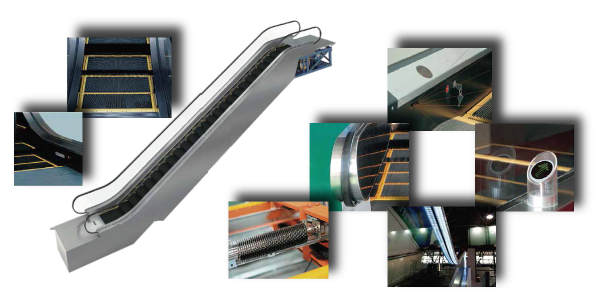What is an Escalator?
Escalators are commonly used to vertically transport high human traffic between different floors of a building. Typically, they take the form of an inclined moving staircase, consisting of a loop of aluminium or stainless steel steps guided by a system of tracks as well as handrails in continuous motion. They occupy the same physical space as a staircase, have no waiting time, allows for a greater flow of human traffic and can have a more practical function than lifts.

General Features
There are 3 basic configurations used for most escalator systems:
- Parallel: Escalators positioned side-by-side, moving in opposite directions
- Criss-cross: Escalators moving in one direction are stacks, maximizing space utility
- Multiple parallel: A bank of 2 or more escalators, with differing directions
|
Rise |
Speed |
Inclination |
Horizontal Pallet Run (mm) |
|
Not limited |
≤ 0.75 m/s |
0° - 6° |
Not required |
|
By Standards |
|
10° - 12° |
400 at the top |
|
|
> 0.75 ≤ 0.9 m/s |
Max. 12° |
1600 at top and bottom, with pallet width ≤ 1.1 m |
* v ≤ 0.65 m/s is recommended.
For Outdoor Applications:
We have special measures in place for escalators that are installed outdoors, since they will be exposed to the effects of weather conditions. These measures are essential for achieving optimal performance and longest possible product life.
General Building Restrictions/ Requirements
For Singapore:
- Prior to operating escalators for use, escalator owners must apply to the Building and Construction Authority (BCA) for a Permit to Operate (PTO).
- Escalators should be designed as per Singapore Standard SS 626: 2017 – Code or Practice for Design, Installation and Maintenance of Escalators and Moving Walks and the Building Construction Authority (BCA)’s Building Control Act.
- Building owners/ operators need to conduct monthly maintenance of escalators (including maintenance of safety switches, sensors, emergency stops and handrails) with an escalator service contractor registered under BCA.
- Inspection and testing for safety of escalators have to be done on an annual basis by escalator service contractors in the presence of an independent SPE.
Models Available
Our FNE escalator series are suitable for all environment types (indoor/semi-outdoor/outdoor) and applications which include retail, hotels and other commercial functions. Encompassing state-of-the-art design and engineering, choose from our wide range of products for one that checks off your list of safety, aesthetics, space saving and performance requirements!
Design Options
Choose a design that not only complements your space style perfectly, but can also withstand years of heavy use – be it ready-made or creating your own. We also offer a range of accessories/add-ons to enhance user functionality and experience.
Speak to our Team
Simply click the button below to speak to our dedicated, experienced and customer centric team for consultation, pricing quotations or to get a guide through the product specifications!
Service and Maintenance
FNE is committed to maintaining good performance through your equipment’s life cycle. We offer a comprehensive post-purchase maintenance, repair and retrofitting services for our FNE range that will keep your equipment functioning safely and reliably. With FNE’s cutting-edge technology and our highly-skilled Service Team, users can expect fewer callbacks and inconvenience due to service down time.
